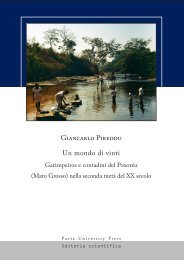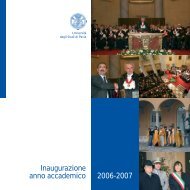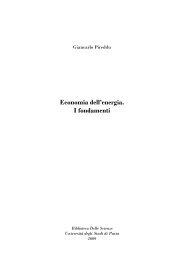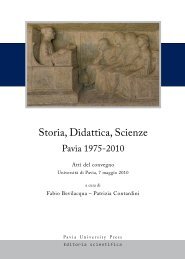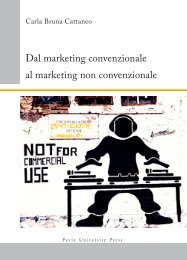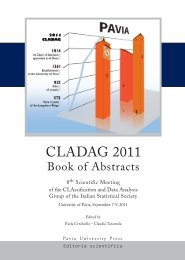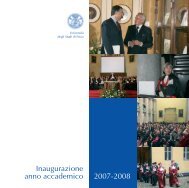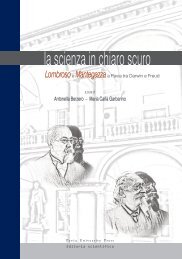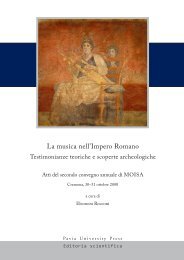Musica che affronta il silenzio - Scritti su Toru Takemitsu - Pavia ...
Musica che affronta il silenzio - Scritti su Toru Takemitsu - Pavia ...
Musica che affronta il silenzio - Scritti su Toru Takemitsu - Pavia ...
Create successful ePaper yourself
Turn your PDF publications into a flip-book with our unique Google optimized e-Paper software.
154<br />
Giangiorgio Pasqualotto<br />
meet someone whom you recognise as the personification of truth, you have to k<strong>il</strong>l him,<br />
because it is precisely this operation of identification which has to be eliminated. One must<br />
banish the idea that something infinite like truth, enlightenment or nature can be captured.<br />
For Linji the ‘blind idiots’ are all those who ‘look outside’, who content themselves with<br />
names, phrases, theories and doctrines, thinking that all this constitutes Enlightenment.<br />
Whereas in fact to attain enlightenment they should abandon this paraphernalia of forms,<br />
strip away every ‘robe’ and seize experience just as it presents itself: ‘Virtuous monks,<br />
don’t acknowledge robes. Robes cannot moves of themselves, but people can put them on’<br />
(Linji 2009: 259). This propensity to grasp experience prior to any conceptual or linguistic<br />
contamination is so deeply rooted in Japanese culture that it recurs in the writings of the<br />
most important contemporary Japanese ph<strong>il</strong>osopher, Nishida Kitar (1870-1945), considered<br />
the founder of the School of Kyoto. In his first book Chapter 1 deals precisely with<br />
pure experience (jun<strong>su</strong>i keiken) (Nishida 1990: 3-10). 5 Later on, in an essay published in<br />
1923, Nishida reiterated the importance of grasping – rather than ‘describing’ or ‘capturing’<br />
– pure experience through intuition: ‘We may contend that we attain to an even deeper selfconsciousness<br />
in aesthetic intuition than we do in mere conceptual self-consciousness’ (Nishida<br />
1973: 112). Thus for Nishida there is a consciousness which goes deeper than merely<br />
conceptual, abstract, formal awareness. It arises out of artistic intuition and is realised in a<br />
form of attention which goes beyond any artificial separation:<br />
and the sphere of pure experience coincides with the sphere of attention. But the<br />
sphere of pure experience is not necessar<strong>il</strong>y limited to a single form of attention<br />
within the state where <strong>su</strong>bject and object have not yet separated. For example, a<br />
climber's determined ascent of a cliff and a musician’s performance of a piece that<br />
has been mastered through practice. (Nishida 1990: 5-6)<br />
The profound attention paid to the state which precedes separation between <strong>su</strong>bject and<br />
object, and in general any type of separation, is also found in other traditional Japanese<br />
arts which have confronted the problem of space: whether painting, dealing with two-dimensional<br />
space, or architecture, involving the third dimension.<br />
In art we can consider Landscape, painted in 1495 by Sessh Ty (1420-1506).<br />
The true protagonist of this kakemono is the empty space, which accounts for 84% of<br />
the painting’s <strong>su</strong>rface. Out of this space there emerge, in the distance, the diaphanous<br />
shapes of mountain peaks, and in the foreground a few scant brush strokes evoking the<br />
presence of bushes rocks and roofs. In this case too the broad empty backdrop is highlighted<br />
not as an element opposing the representations but in continuity with them,<br />
exalting them, like a pulsating, living matrix which generates them. This is an effective<br />
5 Nishida associates this expression and the corresponding concept with the terms etoku ‘meet and take over’;<br />
taitoku ‘take over physically’; jitoku ‘spontaneous appropriation’; and sets against it rikai ‘intellectual<br />
comprehension’.



